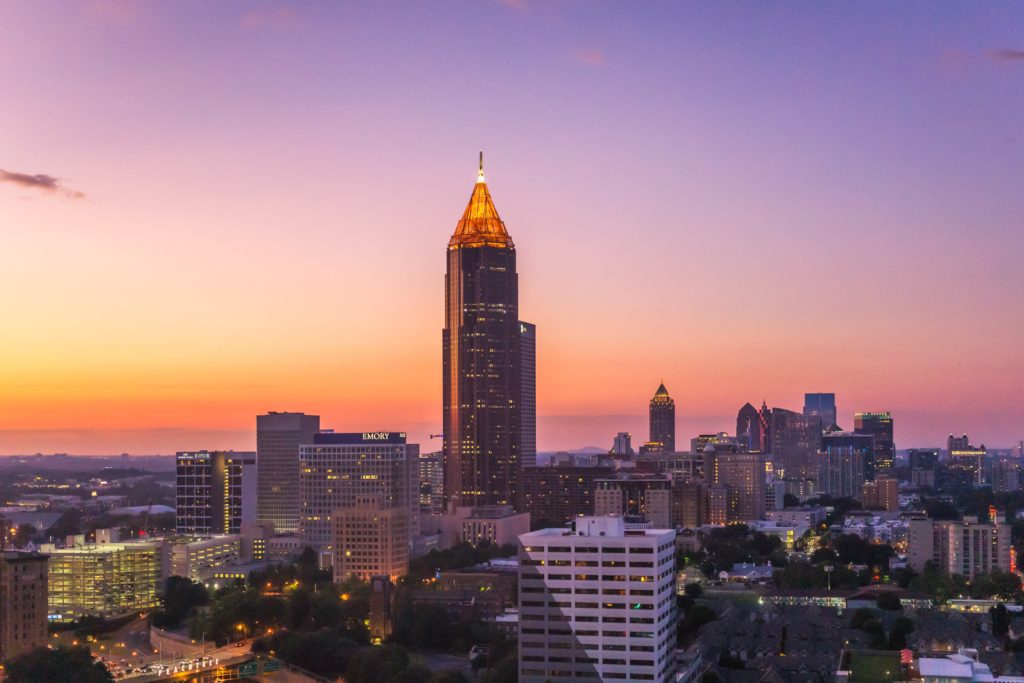These two capital cities face off in a best of Austin vs. Atlanta showdown. Both are beautiful cities that offer their own unique qualities and personalities – one slightly weirder than the other. So let’s take a look at what sets these two cities apart!
Size
While the immediate city of Austin might have a higher population density than Atlanta, the drastic differences lie just outside the city limits. The city of Austin has a population of 961,855, while Atlanta rings in at 498,715. However, the balance of population density is rather different between the two. Atlanta’s metropolitan area holds nearly three times the number of residents as Austin’s suburbs do. Both cities have seen a tremendous amount of growth in the recent decade. Since 2010, Austin has been one of the fastest-growing cities in the U.S. and shows no sign of slowing down.
Diverse Landscapes
Often referred to as the ‘The City in the Forest,’ the Atlanta cityscape brings a little of the outdoors into the city limits. The dynamic city is situated near the rolling Appalachian Mountains and bordered by the Chattahoochee River to the West. Yet, despite its central location in Georgia, it’s just a short drive to the Atlantic coast to soak in that fresh beach air. It offers the best of both worlds.
Austin’s landscape provides immediate access to the beautiful Texas Hill Country, filled with gorgeous rivers and lakes, including the treasured Lake Travis. With ample hiking, kayaking, and fishing opportunities, it’s a great place to share outdoor activities with the family.
Entertainment & Culture
Austin places a lot of pride and joy in the famed Longhorns and The University of Texas at Austin. The acclaimed University contributes to the youthful and vibrant atmosphere of the city. Not only does the city have strong ties to the local University, but the music and food scenes are just as prevalent in the bustling city. If you enjoy live music, then you’ll love Austin. It’s a music lover’s dream with over 1000 live music venues across the city.
If college sports or live music aren’t your thing, then Atlanta might be more your style. While Atlanta has national sports teams such as the Braves and Falcons that call the city home, there is also a wide variety of art and shopping fun to be had. The city is home to the well-known Fox Theatre, Madam C.J. Walker Museum, and the lively Peachtree Street.
Local Economy
In recent decades, Austin has become a hub for the technology, governmental, and education industries. While the city and economy thrive on the large companies, the small businesses sprinkled throughout the city offer a fantastic local snapshot of the community. Small businesses such as Freestyle Language Center, Black Star Co-op Pub and Brewery, In.gredients, or Micklethwait Craft Meats are among some of the local favorites across the city.
The city that first started as a railroad town now holds a place as the 10th largest economy in the country. Major Fortune 500 companies, such as The Coca-Cola Company, UPS, The Home Depot, Delta Air Lines, and numerous others, all call Atlanta home. As a result, the city has seen a lot of growth and recently has also expanded into a hub for the media and technology industries.
How to Choose Between Austin vs. Atlanta?
It may be hard to choose between these two unique cities. Whether you want to be an Atlantan or Austinite, both cities offer amazing opportunities to experience the local culture and diverse landscapes. If you find yourself leaning towards Austin, check out our Lake Travis homes and see if you can find your dream home in the beautiful Texas Hill Countryside.

About the Author
Darlene Louk
Darlene has been involved in the Central Texas real estate field for 30+ years. She received her MBA and BBA-Finance from St. Edwards University in Austin, Texas. Since 2016, she has been responsible for overseeing land and residential development for Hines in the Austin and San Antonio markets. She also serves on the Board of CREW-Austin (Commercial Real Estate Women) and is a member of the Real Estate Council of Austin and the Urban Land Institute. View Darlene’s Full Bio>>

